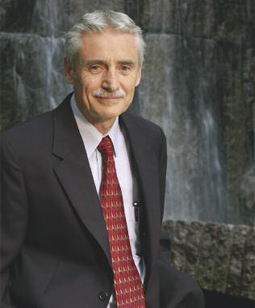News > Arizona State University and Virginia G. Piper Charitable Trust Tap Nobel Prize Winner Dr. Lee Hartwell to Lead Major Health Initiative

September 8, 2009
Arizona State University and Virginia G. Piper Charitable Trust Tap Nobel Prize Winner Dr. Lee Hartwell to Lead Major Health Initiative
 September 8, 2009
September 8, 2009
Tempe, Ariz.— Arizona State University announces the appointment of Nobel Prize winner Dr. Leland "Lee" H. Hartwell to lead an expansive effort addressing two of today's top concerns: improving the effectiveness of health care while reducing its costs, and advancing science education.
Hartwell becomes the first Nobel Prize recipient in medicine to serve a faculty appointment at an Arizona university. He will establish and co-direct the Center for Sustainable Health at ASU's Biodesign Institute as ASU's second Virginia G. Piper Chair of Personalized Medicine. The new center is the latest step in the evolution of the Arizona-based Partnership for Personalized Medicine, launched by Virginia G. Piper Charitable Trust with $35 million in 2007. Piper Trust has provided an additional $2.5 million for the new center.
"Dr. Hartwell already has transformed one worldview of science, earning a 2001 Nobel Prize for insights into the genes that control cell growth," said ASU President Dr. Michael M. Crow. "ASU provides a dynamic environment that will support the type of big ideas he has to help shape health care in the coming decade."
Hartwell's new center in the Biodesign Institute will identify biomarkers, early indicators of disease, to enable personalized, pre-symptomatic diagnoses, and it will develop tools for providing the intelligence needed for better patient outcomes. It will interface with other Biodesign centers working on complementary aspects of these goals.
"In the current health care debate, higher quality and lower cost often are positioned as opposing weights on a scale, but Dr. Hartwell's efforts are aimed at identifying the strategies and technologies that can simultaneously achieve both," said Biodesign Institute executive director Dr. Alan Nelson.
A key aspect of Hartwell's efforts will be redefining health outcomes metrics, encompassing expanded considerations such as the environmental, educational and socio-political impacts on health. He will be assisted in this effort by Dr. Michael Birt, a health policy expert who has been recruited to co-direct the new center.
"Health care metrics, particularly in the U.S., have too long been focused on narrow aspects of cost and quality indicators that have led to an overemphasis on treatment rather than prevention, and a lack of effective tools for clinical decision making," Hartwell said. "Dr. Birt and I will lead efforts to address these challenges, integrating all key stakeholders to create more effective solutions."
Hartwell is no stranger to Arizona, having served as executive chairman of the Partnership for Personalized Medicine since its creation. The partnership includes the Biodesign Institute, Translational Genomics Research Institute (TGen), and Seattle's Fred Hutchinson Cancer Research Center. Hartwell currently is president and director of the Hutchinson Center.
"The trustees of Piper Trust have placed the foundation's biggest bet ever on Dr. Lee Hartwell and his vision of the future of health care," said Dr. Judy Mohraz, president of Piper Trust. "We are delighted that he will soon be at ASU rubbing shoulders with scientists, health care policy makers and students on a routine basis."
Hartwell has announced he will retire from his post at the Hutchinson Center in June 2010. He will then assume his ASU tenured faculty appointment. During the coming academic year, he will begin preliminary preparations for the new center during a phased transition approved by Hutchinson Center. Birt will begin immediately, handling daily operations and start up.
At ASU, Hartwell will have academic appointments in ASU's School of Biological and Health Systems Engineering and School of Life Sciences, areas critical to his sustainable health initiative, and in the College of Teacher Education and Leadership, reflecting his interest in advancing science education. "We must educate the world on the challenges facing future generations and the role of science and technology in meeting those challenges," Hartwell said.
Birt, who was recruited along with Hartwell as a linchpin in co-directing Biodesign's new Center for Sustainable Health, is an internationally renowned health care policy leader. Birt is senior vice president, Health and Society at The National Bureau of Asian Research; executive director of the Pacific Health Summit; and executive director of the Forum for Personal Health. He also holds the position of affiliate investigator at Fred Hutchinson Cancer Research Center. He has consulted for many of the world's leading health care, medical technology and consumer product companies. At ASU, he also will serve as professor of practice in the School of Health Care Management and Policy in the W.P. Carey School of Business.
More about Dr. Hartwell
Dr. Hartwell was awarded the Nobel Prize in physiology or medicine in 2001 for his discoveries of a specific class of genes that control the cell cycle. The cell cycle controls all aspects of cell growth and division. By identifying "checkpoint" genes that determine whether a cell is dividing normally, Hartwell provided important clues to cancer, which arises from abnormal, uncontrolled cell growth.
His interests for the past several years have turned to how researchers can use the enormous knowledge that has accumulated during the last 50 years in genetics and biochemistry to improve molecular diagnostics to benefit human health. By using powerful protein biomarkers, scientists hope to identify individuals at high risk for disease, detect cancer and other diseases at an early stage when they can be cured, and to provide improved prognostic information and better therapeutic response.
Other honors in Hartwell's career include the Albert Lasker Basic Medical Research Award, the Gairdner Foundation International Award, and the Alfred P. Sloan Award in cancer research. He is a member of the National Academy of Sciences.
More about Dr. Birt
Dr. Birt has extensive experience in the private sector and the academic world as well as nonprofits. He has served academic appointments at the University of Washington and Wellesley College. His private sector experience includes the successful launch, development and stock sale of a leading U.S.-Asia biomedical business development company (a U.S.-registered corporation with offices in Japan, Korea, and Taiwan). He co-founded and led a nonprofit corporation (the Pacific Health Alliance) focused on collaborations between U.S. and Japanese healthcare delivery systems in the field of hospital infection control. He launched the Center for Health and Aging within The National Bureau of Asian Research.
About the Biodesign Institute at ASU
The hundreds of researchers at the Biodesign Institute are driven by a passion to solve some of the world's most urgent problems affecting human health and the health of our planet. This includes improving health care through more personalized diagnostics and treatment; providing renewable sources of energy and cleaning our environment; and outpacing the global threat of infectious disease. Biodesign is committed to ensuring that benefits in these areas are available for society, so pursues translation of these discoveries through partnerships with health care and industry. The Biodesign Institute also serves an important role in educating the next generation of scientists, offering hands-on laboratory training to more than 300 students every year..
About the Partnership for Personalized Medicine
The Partnership for Personalized Medicine addresses two critical issues in health care: improving patient outcomes and reducing health care costs. The goal is to better identify disease risk, diagnose disease onset, predict responses to treatment and select appropriate therapies through development, validation and clinical implementation of new diagnostic biomarkers. Success in these efforts will result in greater efficiency and long-term savings, which are maximized through the Partnership's collaboration with health care providers and insurers; policymakers; and researchers nationally and internationally. Launched with charitable investment from two leading Arizona-based philanthropies, the Virginia G. Piper Charitable Trust and the Flinn Foundation, the Partnership unites leadership and research capabilities from the Translational Genomics Research Institute, the Biodesign Institute at Arizona State University, and Fred Hutchinson Cancer Research Center..
About Virginia G. Piper Trust
A private independent foundation, Piper Trust is dedicated to honoring Virginia Galvin Piper's philanthropic commitment to changing lives and strengthening community in Maricopa County (Arizona). By investing in nonprofits and encouraging strategic planning for the future, Piper Trust strives to make Maricopa County a stronger, more nurturing and vibrant community. Since it began awarding grants in 2000, Piper Trust has invested almost $250 million in local nonprofits and programs, including over $40 million in personalized medicine. The Trust paid total grants of $23.8 million in fiscal year 2009. Piper Trust focuses on health care and medical research, children, older adults, arts and culture, education and religious organizations.
Media Contacts:
Joe Caspermeyer
Biodesign Institute
(480)-727-0369
joseph.caspermeyer@asu.edu
Jane Ferguson
Virginia G. Piper Charitable Trust
(480)-556-7125 (office)
jferguson@pipertrust.org

